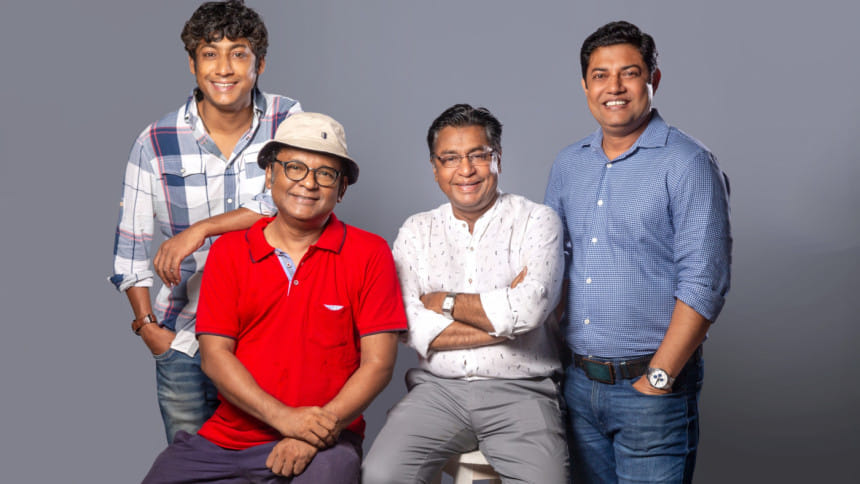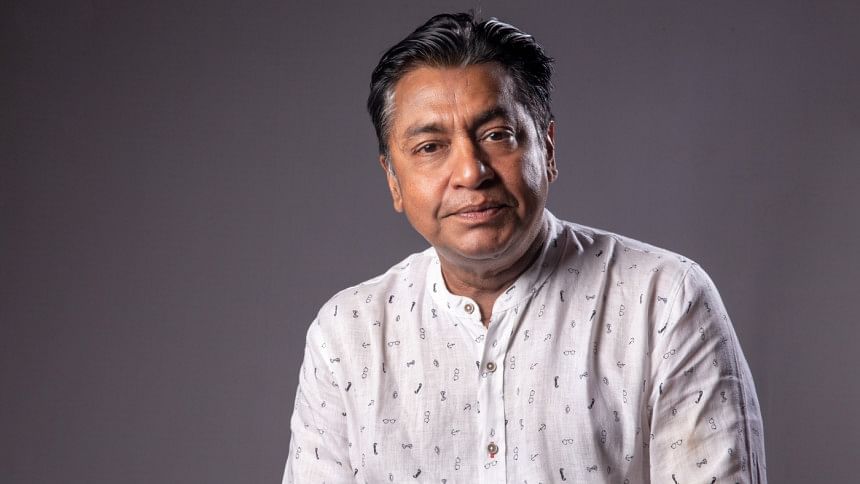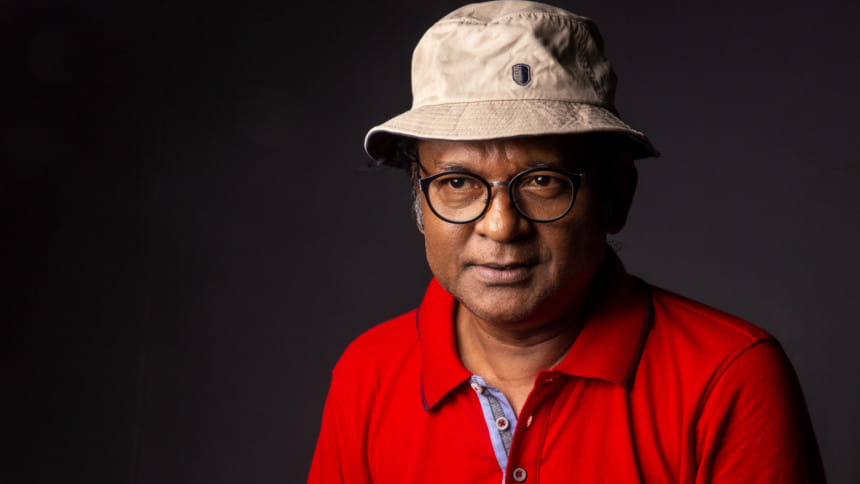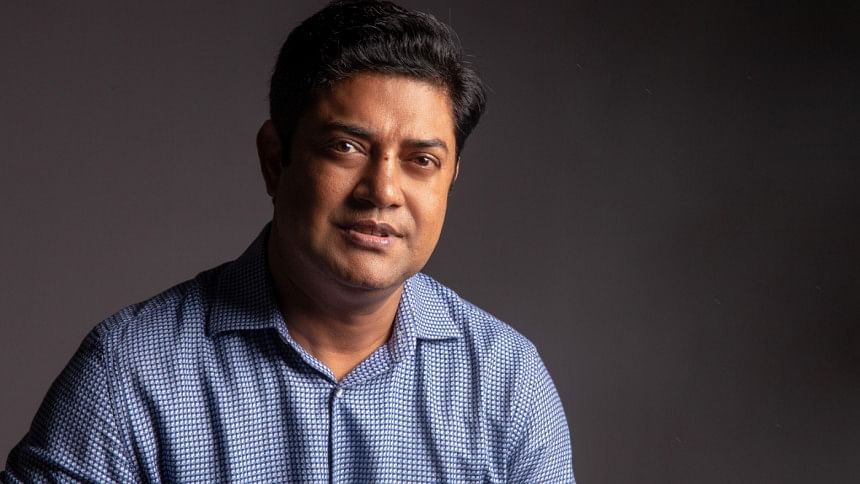A Talk on Actor’s Equity

Rafi Hossain: Welcome to Uncensored with Rafi Hossain. Today, we are here with the newly elected members of 'The Actors' Equity' Bangladesh: Shahiduzzaman Selim, Azad Abul Kalam, Ahsan Habib Nasim and Rawnak Hasan. Congratulations to you all!
Shahiduzzaman Selim: Thank you for having us.
Rafi Hossain: Recently, we have been observing a decline in the quality, as well as the number of viewers, of Bangladeshi dramas. What are your takes on that?
Shahiduzzaman Selim: The number of people who watch Bangladeshi dramas has decreased remarkably. There are a lot of reasons behind this: the quality of actors and the storyline of the dramas are poor, there are too many advertisements, and there has been a significant increase in the number of foreign television channels. We have created this committee to breathe life into this dying art. We are asking for assistance and trying to find ways to enhance the quality of dramas again. We want the audience to watch Bangladeshi dramas, and we want them to be proud of the projects that are being made. To make this happen, however, we need assistance from the government and support from the media.

Azad Abul Kalam: I believe that we need more government policies regarding local television channels. For years, such dramas have shaped the lives of the typical middle income families in Bangladesh. Now, the boom of electronic devices and the popularity of international television channels have made it difficult for our local dramas to keep up. The government needs to establish policies to brand and market our local films and dramas and make them the priority. Another reason behind this problem may be the owners of such channels. Many of them want to make profits, but do not put in the effort to create good projects.
Rafi Hossain: Did you discuss these issues with the Ministry of Information?
Shahiduzzaman Selim: Iresh Zaker, Salauddin Lavlu, Masum Reza and I actually had a meeting with the secretary a few days ago to discuss the details of certain policies that may be established. If they are implemented, I believe we will witness positive changes in the industry. For instance, a problem that needs to be addressed is the programme and preview departments of television companies who now rely on different agencies to do their job for them. As a result, the content and quality of the dramas are being compromised.
Rafi Hossain: Many actors often complain about not getting enough offers to work on projects. Why is that so?
Rawnak Hasan: Like the others mentioned, many producers are focused on making profits. So, they try to hire actors who are not up to par to minimise the costs, rather than hiring professionals. As there is a lack of a proper preview department, this issue is often overlooked.

Rafi Hossain: Is 'The Actors' Equity' taking any step to address such problems?
Ahsan Habib Nasim: There was a movement some time ago at the Shaheed Minar where different people involved with the media gathered to bring certain problems to light. The Actors' Equity was formed to address such matters. We held a seminar last year where we had several meetings to identify exactly why the number of viewers was falling. As you mentioned earlier, actors are not getting good offers. One of the factors behind this is the budget for the dramas. Because of the low budgets, fewer actors can be hired. As there are fewer characters, the dramas become unrealistic, and the audience cannot connect to it. The only way to solve this is to increase the budget and create new and different types of dramas.
Shahiduzzaman Selim: Before a drama is aired, an NOC should be presented to the television company. I believe that rules and regulations have to be established; only then can we ensure that all actors will get equal opportunity, rather than seeing the same faces on most dramas. We need to discuss matters in length with not just the government, but with people involved with the media and non-government organisations.
Azad Abul Kalam: A director can opt for an actor who is not well known if they meet the criteria for a character. Some actors lack self-respect and are unaware of their own talents. So, they can sometimes seem over eager.
Rafi Hossain: What more do you think can be done to promote our local artists and programmes?
Rawnak Hasan: The problem lies within the budget constraint. Script writers use their imagination to come up with new and interesting storylines with different types of characters, but the budget acts as a barrier. They are forced to write scripts containing only a certain number of characters, and this limits their creativity. So, the producers are not at liberty to create projects that they truly love.

Shahiduzzaman Selim: Firstly, I think that it's important to focus on the current state of the industry by featuring them on the front page of newspapers. Secondly, it's also necessary to highlight Bangladeshi films, dramas and actors in the entertainment sections of newspapers. Lastly, we need help from the government to recognise acting as a profession. Culturally important and celebrated artists, especially those who have made major contributions to different forms of art, should also be recognised as such by the government.
Ahsan Habib Nasim: We need to impose government policies to restrict the number of advertisements. We also need government support to create incentives and encourage more people to work in this industry.
Azad Abul Kalam: A lot of people have dedicated their lives to this art form, but after reaching a certain age, they face a lot of financial difficulties. I think the government should make an effort and establish retirement policies for such artists as they have made significant contributions.

Rafi Hossain: Do you think television channels are failing to understand the audience's preferences?
Shahiduzzaman Selim: Different people will have different likes and dislikes when it comes to television shows. It's important for the channels to settle on the demographic they want to focus on, and choose their shows accordingly. For instance, Duronto TV mainly features shows and dramas for children. Television companies need to hire specialists to make such decisions. Unfortunately, many involved with such work lack the expertise and knowledge on the field of arts and culture. Many of them are businessmen with a profit motive, and are not directly involved with this industry. This lacking results in a gap between the producers and the audience, which is why government interference is required.

 For all latest news, follow The Daily Star's Google News channel.
For all latest news, follow The Daily Star's Google News channel. 



Comments